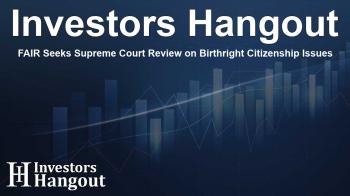FAIR Seeks Supreme Court Review on Birthright Citizenship Issues

FAIR Advocates for Supreme Court Review of Citizenship Law
The Federation for American Immigration Reform (FAIR) is taking action to ensure that the U.S. Supreme Court examines critical issues surrounding birthright citizenship. This appeal comes in response to appellate court decisions that challenge the validity of President Trump's executive order. FAIR, joined by the Landmark Legal Foundation, has filed a significant brief urging the Court to step in and address these pivotal legal questions.
The Core Issue at Hand
At the heart of this case lies the interpretation of the Fourteenth Amendment as it relates to citizenship. A landmark case, United States v. Wong Kim Ark, decided in 1898, plays a crucial role in this discourse. The essential finding of this case established that a child born in the U.S. becomes a citizen at birth if their parents are legally residing in the country. FAIR argues that this interpretation underscores the necessity for parents to have lawful permission to reside in the United States for their children to attain citizenship.
Legal Perspectives Differ
FAIR posits that the prevailing interpretation inaccurately claims that any child born on U.S. soil is entitled to citizenship. According to FAIR, such a broad interpretation ignores the vital aspect highlighted in Wong Kim Ark: the parental status of lawful residence. This nuanced distinction is crucial as it delineates the eligibility for birthright citizenship, specifically excluding children of illegal immigrants and tourists.
Importance of Resolving This Legal Dilemma
FAIR emphasizes that this legal discrepancy demands immediate attention from the Court. They assert that the ongoing misconceptions around the Fourteenth Amendment need correction. The brief articulates the pressing need for the Supreme Court to reaffirm its precedent and clarify its stance on this matter. FAIR states, "This Court should grant certiorari to correct a glaring, widespread legal error, committed by both courts below, about the meaning of one of this Court's central historical precedents." The organization calls for a return to a proper understanding of the ruling that has been misrepresented over the decades.
A Call for Action by Legal Experts
Christopher J. Hajec, deputy general counsel at FAIR, expressed his perspective on the importance of the issue, stating, "This holding has been sleeping in the law books, in a case largely mischaracterized in law schools and by academics, for 127 years. Yet logic shows that it is there and still binding on the Supreme Court." This call to action emphasizes the significant legal ramifications and the potential change in interpretation that could arise if the Court decides to review these cases.
Next Steps for the Supreme Court
The Supreme Court faces pivotal decisions with the cases Trump v. Washington, No. 25-364, and Trump v. Barbara, 25-365, on its docket. Each case presents a unique opportunity for the Court to clarify its stance on birthright citizenship and its implications for immigration policy moving forward. FAIR remains hopeful that the Court will recognize the importance of its previous rulings and take the necessary steps to address these legal ambiguities.
Frequently Asked Questions
What is FAIR advocating for regarding birthright citizenship?
FAIR is urging the U.S. Supreme Court to review court decisions that challenge President Trump's executive order limiting birthright citizenship to children of lawful residents.
Why is the Wong Kim Ark case significant?
This historic case established that a child born in the U.S. is a citizen at birth if their parents are legally residing here, which impacts citizenship laws today.
What do critics say about FAIR's position?
Critics argue that FAIR's interpretation excludes many children born in the U.S. and could have broad implications on immigration policy.
How has the legal understanding of the Fourteenth Amendment changed?
FAIR contends that the interpretation has become distorted, leading to widespread misconceptions about birthright citizenship eligibility.
What are the implications of the Supreme Court's decision on these cases?
A ruling in favor of FAIR could reinforce limits on birthright citizenship, significantly influencing U.S. immigration policy and future legal interpretations.
About The Author
Contact Lucas Young privately here. Or send an email with ATTN: Lucas Young as the subject to contact@investorshangout.com.
About Investors Hangout
Investors Hangout is a leading online stock forum for financial discussion and learning, offering a wide range of free tools and resources. It draws in traders of all levels, who exchange market knowledge, investigate trading tactics, and keep an eye on industry developments in real time. Featuring financial articles, stock message boards, quotes, charts, company profiles, and live news updates. Through cooperative learning and a wealth of informational resources, it helps users from novices creating their first portfolios to experts honing their techniques. Join Investors Hangout today: https://investorshangout.com/
The content of this article is based on factual, publicly available information and does not represent legal, financial, or investment advice. Investors Hangout does not offer financial advice, and the author is not a licensed financial advisor. Consult a qualified advisor before making any financial or investment decisions based on this article. This article should not be considered advice to purchase, sell, or hold any securities or other investments. If any of the material provided here is inaccurate, please contact us for corrections.

